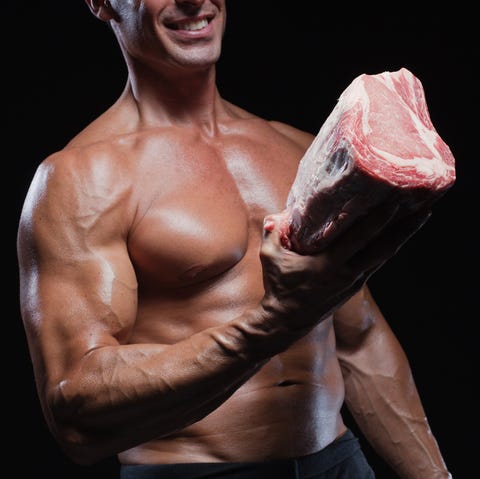Despite what bright new food packaging or so-called “healthier” fast food options might lead you to believe, humans have known about the power of protein since at least the early 19th century.
That’s when a Swedish chemist named the molecules using a word from the Greek, proteios, meaning “holding first place” and therefore most important.
Today, if society resurrected that Swede and dumped him into an American supermarket, he might feel smugly validated. In the eyes of consumers and marketers, the nutrient is indeed the most important—ubiquitous, beneficial, desirable, and, now, lucrative.
So lucrative, in fact, that the global protein-supplements market is projected to reach a powerful $21.5 billion by 2025, according to industry reports. So, yes, you’d expect to find whey in your post-gym shakes and bars, but now protein is popping up everywhere.
You can wake up and have a protein-rich bowl of cereal, grab a whey-infused Protein2o water on your way out the door, pick up a Chicken Wrap Protein Box at Starbucks for lunch, and munch on ranch-flavored Quest Nutrition protein chips as a mid-afternoon desk snack.
Nielsen, a worldwide data-analytics company, found that 55 percent of U. S. households now regard protein as an important consideration when they purchase food.
What’s more, Nielsen saw an eight percent sales uptick for products claiming to be an “excellent” or “good” source of protein on the front of their packaging.
So protein products are all over the place, and people are hungry for more protein, but here’s the thing: Not everyone knows exactly what the best sources of protein are.
In fact, between 45 and 64 percent of consumers did not identify beef, pork, or chicken as being high in protein, even though all those foods are loaded with it, according to a recent survey.
There’s still a fair amount of confusion around a nutrient that’s been around, well, forever.
So you have to wonder if that’s due to crafty marketers, misunderstood dietary prescriptions, or clueless internet “experts” make misleading claims about what, exactly, makes something “high-protein” to begin with.
We’re here to clear that all up.
Protein is particularly important if you want to build muscle, but also fill up at meals and stay full between meals. But you need to consume a certain amount of it—scientists have studied this—in order for its effects to take root.
Here’s Exactly Why You Need Protein
Protein is vital to life: It’s made from amino acids that are essential for building and maintaining muscles and bones. In addition, recent studies suggest that protein quality, or the total makeup of amino acids within a protein source, may become more important as you age.
But beyond your infrastructure, protein also helps to regulate a host of cellular processes, affecting everything from your immune function to the transportation of oxygen through the bloodstream. Protein can even aid in weight loss: Researchers have found that consuming it stimulates the release of satiety signals in the small intestine, helping you feel full.
In short, protein is a super-nutrient. A do-it-all. A power player in how you use your body and what it looks like.
Protein is important. In fact, it’s vital for building the body you want. Protein helps decrease hunger, builds and maintains muscle, fortifies your bones, improves brain function, aids your immune system, and can even pick up the kids from soccer practice if you’re strapped for time.
We digested the past 25 years of nutrition knowledge, talked to the smartest experts about the latest science, and sorted through a lot of nutrition B.S.—all to provide you with the most up-to-date information about protein right now.
Here’s Why You’re Probably Not Eating Enough Protein
The irony of the protein boom is that Americans aren’t actually ingesting any more of it today than they were 30 years ago.
That might be because protein’s recommended daily allowance is a modest 0.8 grams per kilogram of body weight per day, a number formulated during World War II in order to safeguard public health during a possible shortage and ensure the nutritive value of military rations.
“That RDA means roughly 8 to 10 percent of your daily intake should be protein,” says Heather Leidy, Ph.D., a protein researcher and associate professor in Purdue University’s Department of Nutrition Science.
But that 8 to 10 percent is only the minimum required to prevent a protein deficiency, not what you need for protein synthesis, muscle gain, satiety, weight management, and glycemic control.
While the diets of most Americans may contain between 10 and 15 percent protein, Leidy notes, research suggests that anywhere from 20 to 30 percent would be a better health goal—with at least 30 grams of protein being the minimum threshold at mealtime.
Another way to look at it: That’s between 1.2 and 1.6 grams of protein daily for every kilogram of your target body weight. So if you’re a 185-pound guy who wants to weigh 165, you should eat between 90 and 120 grams of protein per day.
The good news is that higher amounts of protein as a result of all these snacks and shakes won’t harm the liver, kidneys, or bones of healthy people, as some once claimed; however, excess protein can mean excess calories, which may lead to weight gain, Leidy says.
Still, that’s a lot of protein, you might be thinking to yourself. If you read into it, you may think you need to break out your calculator and begin tracking your intake—but we swear it’s not as complicated as you might think.
Actually, it’s pretty easy.
Here’s Exactly How Much Protein You Should Eat for Muscle Gain and Weight Loss
Regardless of your goal the answer is simple: 30 grams of protein at every meal.
A 180-pound guy who wants to maintain his current weight would need 100 to 130 grams, or six palm-sized portions of protein-rich foods, every day. That’s about 30 grams at each meal and an additional 10 to 20 grams in two snacks. Chicken breast is great, but so are chicken thighs, tofu, salmon, pork, shellfish, whitefish, lamb, tempeh, and much more.
And don’t forget that a heaping scoop of most protein powders will net you around 30 grams of the nutrient.
Within the larger picture of your daily diet, that means you’ll want to consume 30 percent of your daily 2,600 calories from protein.
And, yes, that includes plant proteins.
If you’re trying to reduce the amount of meat you’re eating, you need to swap in a high-protein plant food.
Some plant foods that are high in protein: soybeans (and tofu, and soy milk), quinoa, chickpeas, lentils, any kind of nut, peas, any kind of bean, and seitan. You can use an app to track your nutrient intake, or you can simply aim for a palm-sized portion of whatever protein you’re including in your meal.
Also, be careful with snacking. You’ll find some “protein” products on the market that contain a measly four grams per serving, along with an abundance of added sugars.
It’s not that protein-centric BBQ chips are bad for you. It’s just that, for the same price, you could purchase six whole ounces of another health food that supplies 20 grams of protein along with vitamin B12, calcium, and zinc. It’s called Greek yogurt.
There’s one exception to the 30-gram rule, however, and it pertains to people who are looking to build muscle. Doing so requires more protein than the baseline level, as protein helps to repair muscle tears that occur during heavy lifting (and lead to more muscle).
Experts differ on what the exact amount of protein you need to build muscle, but the general consensus is that if your goal is muscle gain you should consume 1 gram of protein for every pound of your target body weight.
So if you want to weigh a muscle-stacked 185, that’s 185 grams of protein daily.
Here’s What Happens If You Don’t Get Enough Protein
At best, you won’t build the muscle you want and you may find yourself snacking more often, which can lead to weight gain. At worst, you may suffer a protein deficiency—which is not something to be trifled with.
This content is created and maintained by a third party, and imported onto this page to help users provide their email addresses. You may be able to find more information about this and similar content at piano.io






Comments are closed.